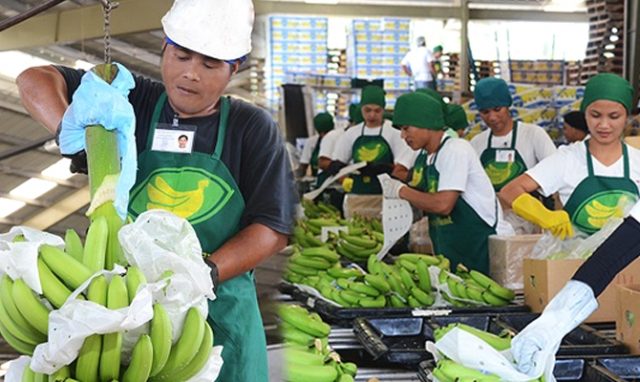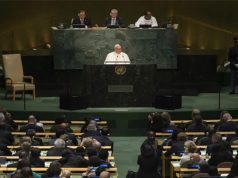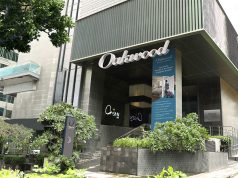MANILA, Philippines – In what could be a major setback for President Rodrigo Duterte’s main election campaign backer, Davao del Norte Representative Antonio Floirendo Jr., the Department of Justice has recommended the revocation of the joint venture agreement between the Bureau of Corrections (Bucor) and Floirendo-led Tagum Agricultural Development Co. (Tadeco), on grounds that the deal is unconstitutional.
He said Tadeco made it appear that there was a joint venture agreement to get away with the provision of the 1935 Constitution that allowed a private corporation to use a maximum of 1,024 hectares of public land, which was reduced in the 1987 Constitution to 1,000 hectares.
“Tadeco is doing this to justify the deal because under the Constitution, government cannot lease more than 1,000 hectares, yet Tadeco was renting for over 5,000 hectares of public land,” he said.
Tadeco, the country’s largest banana exporting company, is owned by the family of Floirendo, who is believed to have contributed as much as P75 million to Duterte’s campaign, making him the top donor.
At a congressional hearing, Justice Secretary Vitaliano Aguirre II also recommended that the 5,308 hectares of land owned by the Davao Prison and Penal Farm in Panabo City, Davao del Norte, where Tadeco operates its vast banana plantation, be reclassified as alienable and disposable to allow Bucor to enter into agreement with other parties through public bidding.
“We believe that, if ever there’s an entity with the right to question the contract, it would be Bucor because it’s one of the contracting parties to the agreement,” Aguirre said.
A joint hearing of the committees on good government and on justice was conducted in response to House Resolution No. 867, filed by Speaker Pantaleon Alvarez, who described the Tadeco-Bucor agreement as “grossly disadvantageous” to the government.
‘Baseless, misplaced’
Floirendo, Alvarez’s erstwhile bosom buddy, did not attend the hearing, but said that the allegations against Tadeco were “baseless and misplaced.”
“I deemed it more prudent to recuse myself from participating to avoid any perception of personal interference or influence on the House panel,” he said in a letter read at the hearing.
Alvarez has also filed a complaint against Floirendo before the Office of the Ombudsman over the deal.
The two Davao congressmen, known to be among Duterte’s staunchest allies, are now locked in a bitter dispute that some accounts are attributing to a spat between their respective romantic partners.
Bucor and Tadeco first entered into a joint venture agreement on July 1, 1969 that allowed the company to lease some 3,000 hectares for its banana plantation.
Joint venture
In 1979, they signed a consolidated joint venture agreement, under which Tadeco leased 5,212.46 hectares of land from Bucor for an extended period of 25 years.
In 2003, the consolidated joint venture agreement was renewed and, based on the contract, Bucor would receive a guaranteed annual production share of P26.54 million, an amount that would automatically increase by 10 percent every five years.
But Alvarez claimed that the government was “prejudiced” by as much as P106.16 million per year if prevailing industry practice were to be applied.
At the hearing, Alvarez insisted that Tadeco was paying Bucor for a rent agreement, not a joint venture agreement.
Alvarez: It’s rental
Valoria had pointed out that the deal could also not be described as a lease agreement, saying “the principal objective of the joint venture agreement is the rehabilitation of the inmates of the Davao Prison and Penal Farm.”
In a statement read at the hearing, Valoria remarked the contract between Bucor and Tadeco has passed the review of 14 Secretaries of Justice, who upheld its validity.
“And so here we are again, facing another probe that honestly caught me by surprise. I thought that this would be the one administration where we would not have to undergo another probe. But then again, there may be other motivating factors at play here that I am not aware of,” he said.
“In essence, it’s rental, ‘wag na tayong maglokohan (let’s not be kidding each other),” he said, adding that the primary objective of the company was profit-driven, and not to help rehabilitate the inmates of the Davao Penal Colony (DAPECOL), as claimed by the company’s president and chief executive officer, Alex Valoria.
In a separate news conference, Albay Representative Edcel Lagman disclosed that 27 years ago, in June 1990, the House agrarian committee he chaired during the 8th Congress had recommended that the property be placed under the coverage of the Comprehensive Agrarian Reform Law.
Agrarian reform
In that recommendation, the committee indicated: “In fine, areas covered by the DAPECOL-TADECO Joint Venture Agreement, being commercial farms, must forthwith be covered under CARL for distribution to qualified agrarian reform beneficiaries as determined by DAR, without prejudice to Tadeco entering into leasehold agreement with the beneficiaries.”
Ifugao Rep. Teddy Baguilat and Akbayan Rep. Tom Villarin said Congress and the Department of Justice should go beyond the Tadeco issue and look into other government agricultural lands, such as those used as military reservations and those occupied by State Universities and Colleges, to see if portions of these lands could be distributed to agrarian reform beneficiaries.
“If the Speaker is serious about agrarian reform, he should also look at other agricultural lands and see how can they be distributed to the farmers,” he said.
Rep. Villarin added: “If the Speaker will just focus on Tadeco, people might construe this as just political infighting.”










